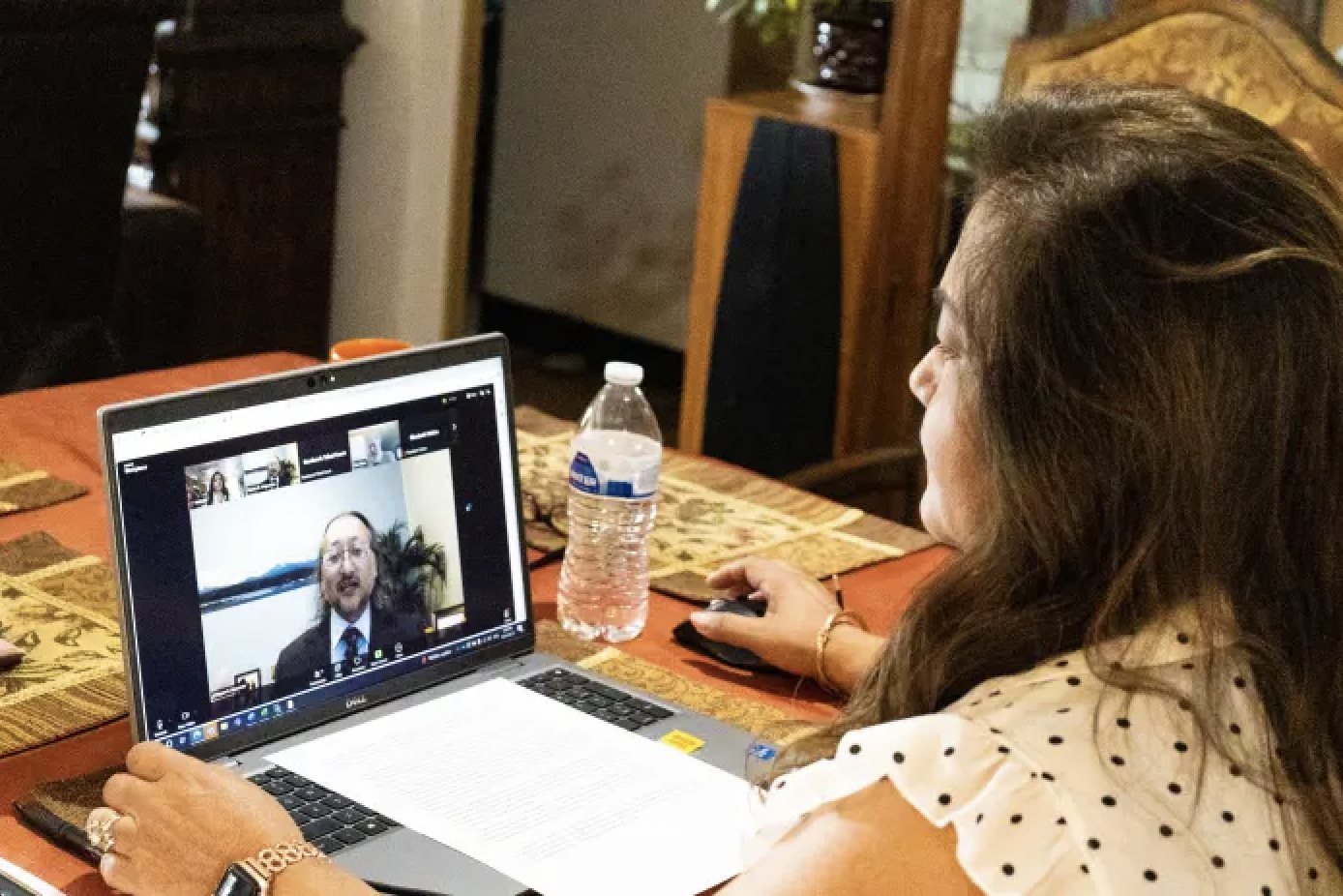Nooksack Judge Pro Tem Charles Hostnik presides over a Nooksack tribal court eviction hearing in 2023; Norma Aldredge watches on with Michelle Roberts
According to Indian Country Today, the same Nooksack trial court judge who ordered the eviction of several Nooksack families refused to recuse himself from an a closely related appellate eviction ruling that came down last week. As a result, Nooksack elders and families are now threatened with physical eviction by Tribal police from homes they have rented to own for nearly twenty years.
“Judicial Misconduct” at Nooksack
As reported, Tacoma lawyer Charles Hostnik “sat on an appeal that involves the four cases he decided as pro tem tribal court judge” in 2023. Hostnik “did not recuse himself and was not removed from the panel” that affirmed eviction decisions in three “connected” cases on Wednesday. While writing the September 18, 2024 appellate ruling, Hostnik “included pages of identical text to his February 2023 ruling.”
Verbatim excerpts of Hostnik's February 2023 summary judgment decisions (top) and September 2024 appellate ruling (bottom)
Hostnik, Indian Country Today reported, “used his summary judgment decisions against certain members of the family to decide and write the appellate opinion against the others.”
On August 29, 2024, Michelle Roberts, lay advocate for herself and the Nooksack families, filed a motion for Hostnik’s recusal. Nooksack Appeals Court Chief Judge Rajeev Majumdar denied her request because it “came at a late hour.” Majumdar did not address Roberts’s arguments that under Nooksack law, Hostnik’s consideration of essentially “his own decisions” at the Nooksack trial court level, amounted to a conflict of interest on appeal according to Nooksack law.
Last Wednesday night, Roberts, who along with her dad and uncle are now facing eviction from their federal Low Income Housing Tax Credit homes, shared her stunned dismay with Indian Country Today reporter and Northwest Bureau Chief Luna Reyna:
I will never forget being in front of the judge at Nooksack and then realizing that the same judge was on the appellate court of judges asking me questions. Thinking, is this judge really part of our appeals being able to make a decision on his own decision against his own decision? I don’t even know how to write that.
The next day, Gabriel Galanda filed a brief before the Nooksack appeals court that appended highlighted copies of Hostnik’s appellate ruling and prior summary judgment rulings, showing the pages of language he copied. He and other Galanda Broadman lawyers have their own due process appeal pending before the Nooksack appeals court. Galanda filed the brief in that proceeding.
Galanda Broadman lawyers have been representing the seven Nooksack families since 2013, but Galanda and other firm lawyers remain “blocked from practicing law at Nooksack.” Last year, as Nooksack pro tem judge, Hostnik “blocked Galanda from even helping his clients write their court papers since he was no longer able to represent them in court.” Although under Washington sate ethics laws, “lawyers may ghostwrite for pro se parties in state court civil litigation,” Hostnik foreclosed that legal assistance to the seven families.
Meanwhile, the Washington State Bar Association (WSBA) has declined to exercise its established jurisdiction over lawyer misconduct to discipline any of the several state-licensed lawyers who caused the strategic disbarment of eight Galanda Broadman lawyers in 2016.
In 2022, Majumdar served as WSBA President while the organization was considering disciplinary grievances against Ray Dodge, the chief architect of Galanda Broadman’s disbarment. When Majumdar became a Nooksack pro tem judge, that year, his dual roles raised appearance of fairness concerns within the WSBA’s Board of Governors, causing the board to consider a new ethical rule to disallow judges from serving elected state bar leadership positions.
To avoid appearance of fairness issues within either state courts or bar associations, at least nineteen state bar associations do not allow judges or pro tem judges from serving in elected bar leadership positions. In Utah, for example, judges are not “permitted to accept governmental appointments that could interfere with the effectiveness and independence of the judiciary.” A divided WSBA Board of Governors, however, declined to adopt the proposed ethical rule. Majumdar later became the Nooksack appeals court’s Chief Judge.
Hostnik and Majumdar are not believed to be considering the Galanda Broadman lawyers’ pending due process appeal, but both collaborated to issue last week’s appellate ruling against the Nooksack families. In that ruling, which Majumdar signed, Hostnik also invited Nooksack housing authorities to “collaborate with the Nooksack Police Department as necessary . . . on evictions."
United Nation human rights experts have decried the Tribal political deployment of armed Nooksack cops to the families’ homes since 2021.
Michelle Roberts appears before Nooksack Appeals Court Chief Judge Rajeev Majumdar on August 20, 2024
“So Incredibly Beyond the Pale”
The appellate brief Galanda filed on Thursday reads:
Yesterday, the Appeals Panel in Cause 2024-CI-APL-004 affirmed Nooksack trial court summary judgment decisions against three Pro se Appellants. Appendix A. Appellate Judge Charles Hostnik wrote the Appellate Opinion and Chief Judge Rajeev Majumdar issued the decision. Compare Appendix A at 12-16, with Appendices B, C at 3-5, 11-13. Astonishingly, Judge Hostnik’s Appellate Opinion includes five pages of verbatim language lifted from summary judgment decisions that Judge Hostnik wrote against Pro se Appellants in 2024-CI-APL-002 as Tribal Court Pro Tem Judge in 2023. Id. (highlighted verbatim text).
This is precisely what Michelle Roberts warned would happen when she sought Judge Hostnik’s recusal from Cause 2024-CI-APL-004 on August 29, 2024. She wrote:
“During the hearing on Tuesday, Nooksack appellate judge Charles Hostnik was one of the three appellate judges. He was also the pro tem tribal court judge on Olive Oshiro, Norma Aldredge, Alex Mills, and Saturnino Javier’s eviction cases. All seven of us are more or less in the same legal position when it comes to our LIHTC homes. All of the LIHTC property rights issues are the same. I prepared all seven of our appeal notices and they are the same or similar. . . . Because all seven cases are connected, Judge Hostnik is basically sitting on an appeal that involves the four cases he decided as pro tem tribal court judge. It would be unfair for him to sit on my, my dad Michael Rabang, and my uncle Francisco Rabang’s appeals. Judge Hostnik issued “summary judgment” in the Oshiro, Aldredge, Mills, and Javier cases, and is now considering whether “summary judgment” was correct in our related appeals. He would naturally want to find in favor of “summary judgment.” I do not know how he can be impartial to his own decisions. This is a Conflict of Interest.”
Ms. Roberts’s words proved prescient. Judge Hostnik “naturally [found] in favor of “summary judgment,” going so far as to graft pages of language in his summary judgment orders into the Appellate Opinion issued against Michelle and her father and uncle. Compare Appendix A at 12-16, with Appendices B, C at 3-5, 11-13 (highlighted verbatim text).
Judge Hostnik should have recused himself from serving on the the Appeals Panel in Cause 2024-CI-APL-004, or Chief Judge Majumdar should have granted Ms. Roberts’s recusal motion and disqualified Judge Hostnik from serving on that panel.
Instead, on September 5, 2024, Chief Judge Majumdar denied Ms. Roberts’s recusal motion because it “came at a late hour,” after he appointed Judge Hostnik to the Appeals Panel in Cause 2024-CI-APL-004 on April 17, 2024. As she told Chief Judge Majumdar in her motion, it was not until August 27, 2024 when Ms. Roberts realized that the same judge who “issued ‘summary judgment’ in the Oshiro, Aldredge, Mills, and Javier cases, and is now considering whether ‘summary judgment’ was correct in our related appeals [Roberts, M. Rabang, and F. Rabang].” This speaks to precisely why Pro se Appellants need—and have always needed—legal counsel in these property and housing rights appeals—as is their right at Nooksack.
There is no other court in the country—Tribal, state, or federal—where a judge who decided four “connected cases” at the trial court level, would sit on an appeal of three other “connected cases . . . where [a]ll of the LIHTC property rights issues are the same.” Not one. Rules and norms of judicial conduct would not allow such impropriety. And it is not only Pro se Appellants who suffer from this judicial impropriety as they fear evictions and property takings—it is Tribal nations and judiciaries writ large. Declaration of Gabriel S. Galanda (June 3, 2024), Ex. E (Ex. 8 thereto) (Washington State Bar Association (April 10, 2018) at 3: The Nooksack ‘’justice system’ is probably not worthy of that description”); id. (Ex. 4 thereto) at 8-9 (Amici Curiae Law Professors (Sept. 19, 2016): “[T]he ripple effect of [the] lawlessness will reach far beyond the boundaries of Nooksack. . . . The suspicions and denigrations of tribal courts as second-class forums will gain credence among those that are hostile to tribal sovereignty.”).
“This judicial misconduct would not happen in any other court system in the country,” Galanda reiterated to Indian Country Today. “It is all so incredibly beyond the pale.”

















